Unit3TravelJournal知识点教案
英语Unit3 Travel Journal知识点教案
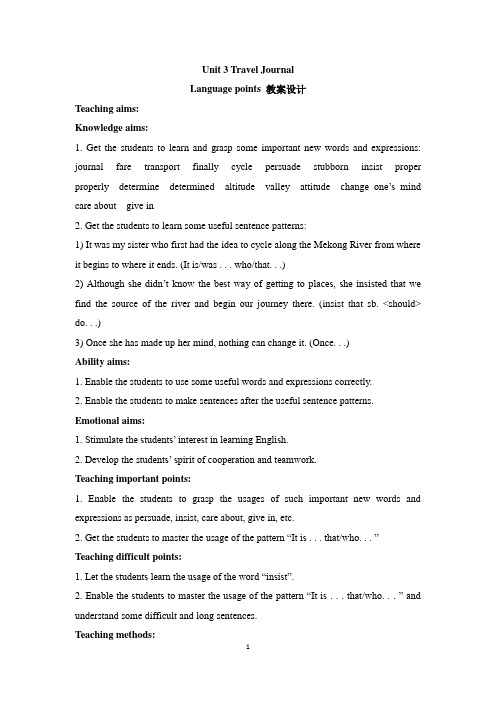
Unit 3 Travel JournalLanguage points 教案设计Teaching aims:Knowledge aims:1. Get the students to learn and grasp some important new words and expressions: journal fare transport finally cycle persuade stubborn insist proper properly determine determined altitude valley attitude change one’s mind care about give in2. Get the students to learn some useful sentence patterns:1) It was my sister who first had the idea to cycle along the Mekong River from where it begins to where it ends. (It is/was . . . who/that. . .)2) Although she didn’t know the best way of getting to places, she insisted that we find the source of the river and begin our journey there. (insist that sb. <should> do. . .)3) Once she has made up her mind, nothing can change it. (Once. . .)Ability aims:1. Enable the students to use some useful words and expressions correctly.2. Enable the students to make sentences after the useful sentence patterns. Emotional aims:1. Stimulate the students’ interest in learning English.2. Develop the st udents’ spirit of cooperation and teamwork.Teaching important points:1. Enable the students to grasp the usages of such important new words and expressions as persuade, insist, care about, give in, etc.2. Get the students to master the usage of the pat tern “It is . . . that/who. . . ”Teaching difficult points:1. Let the students learn the usage of the word “insist”.2. Enable the students to master the usage of the pattern “It is . . . that/who. . . ” and understand some difficult and long sentences.Teaching methods:1. Discussing, summarizing and practicing2. Cooperative learningTeaching tools:The multimedia and other normal teaching toolsTeaching procedures:Step 1 Revision1. Check the homework exercises.2. Ask some students to tell something about Wang Kun and Wang Wei’s bike trip or the Mekong River.Step 2 Reading and practice1. Get the students to read the reading passage again to underline all the new words and useful expressions or collocations in the passage.Collocations: dream about, graduate from, get the chance to do sth. , persuade sb. to do sth. , grow up, get sb. interested in sth. , care about, give sb. a determined look, change one’s mind, make up one’s mind, give in, keep doing sth. , pass through, be surprised to do sth. , at last2. Do the exercises in Discovering useful words and expressions on Page 20.Step 3 CheckingExplain the problems the students meet while checking the answers.Step 4 Language Points1. dream about dream of 梦想,梦见(后接名词、代词或动名词)The young soldier sometimes dreams about/of his hometown.这名年轻的士兵有时会梦到自己的家乡。
教学设计21:Unit 3 Travel journal
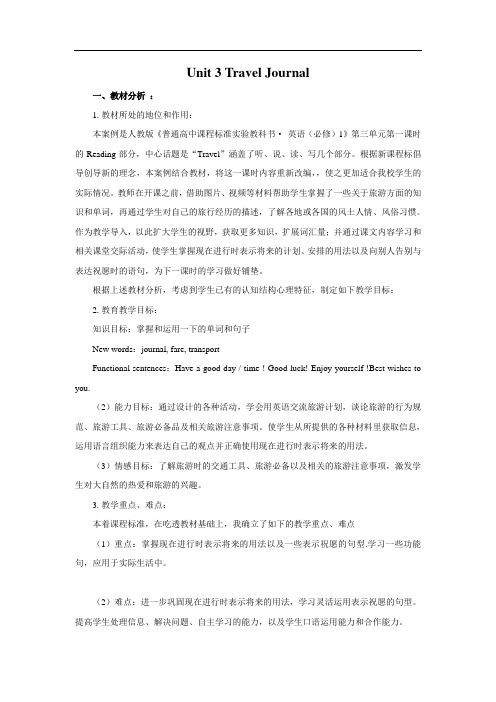
Unit 3Travel Journal一、教材分析:1. 教材所处的地位和作用:本案例是人教版《普通高中课程标准实验教科书·英语(必修)1》第三单元第一课时的Reading部分,中心话题是“Travel”涵盖了听、说、读、写几个部分。
根据新课程标倡导创导新的理念,本案例结合教材,将这一课时内容重新改编,,使之更加适合我校学生的实际情况。
教师在开课之前,借助图片、视频等材料帮助学生掌握了一些关于旅游方面的知识和单词,再通过学生对自己的旅行经历的描述,了解各地或各国的风土人情、风俗习惯。
作为教学导入,以此扩大学生的视野,获取更多知识,扩展词汇量;并通过课文内容学习和相关课堂交际活动,使学生掌握现在进行时表示将来的计划、安排的用法以及向别人告别与表达祝愿时的语句,为下一课时的学习做好铺垫。
根据上述教材分析,考虑到学生已有的认知结构心理特征,制定如下教学目标:2. 教育教学目标:知识目标:掌握和运用一下的单词和句子New words:journal, fare, transportFunctional sentences:Have a good day / time ! Good luck! Enjoy yourself !Best wishes to you.(2)能力目标:通过设计的各种活动,学会用英语交流旅游计划,谈论旅游的行为规范、旅游工具、旅游必备品及相关旅游注意事项。
使学生从所提供的各种材料里获取信息,运用语言组织能力来表达自己的观点并正确使用现在进行时表示将来的用法。
(3)情感目标:了解旅游时的交通工具、旅游必备以及相关的旅游注意事项,激发学生对大自然的热爱和旅游的兴趣。
3. 教学重点、难点:本着课程标准,在吃透教材基础上,我确立了如下的教学重点、难点(1)重点:掌握现在进行时表示将来的用法以及一些表示祝愿的句型.学习一些功能句,应用于实际生活中。
(2)难点:进一步巩固现在进行时表示将来的用法,学习灵活运用表示祝愿的句型。
英语必修一unit3教案
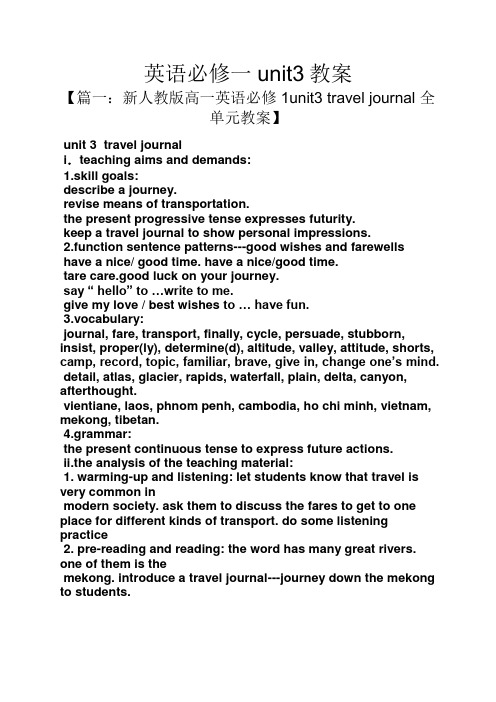
英语必修一unit3教案【篇一:新人教版高一英语必修1unit3 travel journal 全单元教案】unit 3 travel journali.teaching aims and demands:1.skill goals:describe a journey.revise means of transportation.the present progressive tense expresses futurity.keep a travel journal to show personal impressions.2.function sentence patterns---good wishes and farewellshave a nice/ good time. have a nice/good time.tare care.good luck on your journey.say “ hello” to …write to me.give my love / best wishes to … have fun.3.vocabulary:journal, fare, transport, finally, cycle, persuade, stubborn, insist, proper(ly), determine(d), altitude, valley, attitude, shorts, camp, record, topic, familiar, brave, give in, change one’s mind. detail, atlas, glacier, rapids, waterfall, plain, delta, canyon, afterthought.vientiane, laos, phnom penh, cambodia, ho chi minh, vietnam, mekong, tibetan.4.grammar:the present continuous tense to express future actions.ii.the analysis of the teaching material:1. warming-up and listening: let students know that travel is very common inmodern society. ask them to discuss the fares to get to one place for different kinds of transport. do some listening practice2. pre-reading and reading: the word has many great rivers. one of them is themekong. introduce a travel journal---journey down the mekong to students.3.learning about language: in this part, students will discover useful words and expressions and also learn useful structures---- the present continuous tense to express future actionsing language: present how to write a travel journal and then practise writing iii.teaching arrangment1stperiod 2nd period 3rd period 4thperiodwarming-up and listening reading learn about languageusing languagethe first period warming-up and listeningteaching aims1. to talk about things related to travel, e.g. the place the fares and transport, etc.2. to improve the ss’ listening ability.teaching important points1. to talk about travel.2. to tell the ss how to catch the key points when they do listening.emotion goals:there are so many beautiful places in china and the whole world. we should love our country, love the whole world and love nature.teaching aidsa tape recorder, a projector and a computerstep 1. a song (歌词见后面)step 2 warming upshow the photos of some beautiful places on the powerpoint. (the great wall; yuanming yuan ; budala palace; venice; the liberty statue in new york,america; fujiyama.)ask students whether they know where they are.then t ask: do you like traveling? ss: yest: why do you like traveling? (超级链接):enjoy beautiful scenery; increase our knowledge; make friends; be good to health…ss may have a lot of different ideas. give them time to talk freely.t ask: how will you prepare for traveling? (including the time, the place, the means, the cost, the things you’ll take along, … of traveling) (超级链接) :1. time (超级链接):the spring festival; national day; may day; weekend; summer( winter) vacation…2.destination(超级链接): enjoy some beautiful pictures of famous places with the whole class: huangshan黄山; jiuzhaigou九寨沟; guilin桂林; stone forest(石林); jiuquxi(九曲溪; yunufeng,wuyi(武夷玉女峰); sanqing mountain三清山; hangzhou;longmen caves (龙门石窟);tian’anmen square(天安门广场);terracotta,xi’an(西安兵马俑); summer palace(颐和园); london bridge;the opera house悉尼歌剧院; eiffel tower艾菲尔铁塔.3.what to do(超级链接): rock climbing; rafting; bengee; skiing; hikingallow the ss to talk more about it.4.travel cost: talk with the ss quickly.5.things to take(超级链接): id cards(身份证) passports; money (cash); a book of maps; 等。
人教版选修一英语unit3教案

人教版选修一英语unit3教案Unit 3 Travel journal【Introduction】In this unit, we will read a travel journal written by a young backpacker named Joe. Through Joe's vivid and detailed descriptions, we will learn about his unforgettable adventures and experiences during his solo trip around Southeast Asia. This travel journal not only introduces us to the diverse cultures and breathtaking landscapes of this region but also provides us with valuable insights into the challenges and rewards of independent travel.【Tasks and Goals】1. Develop students' reading comprehension skills.2. Improve students' ability to analyze and interpret the author's point of view.3. Enhance students' vocabulary and language skills related to travel and cultural exploration.4. Encourage students to reflect on the importance of stepping out of their comfort zones and embracing new experiences.【Teaching Procedures】Step 1: Pre-reading (15 minutes)- Introduce the topic of the travel journal to capture students' interest.- Activate students' background knowledge by asking them about their travel experiences or dreams.- Show some pictures of famous landmarks in Southeast Asia to generate discussion and engage students.Step 2: Reading (30 minutes)- Distribute copies of the travel journal to each student.- Ask students to read the journal silently and underline any unknown words or phrases.- Conduct a guided reading session, focusing on comprehension and analysis of the text.- Encourage students to discuss their interpretations and impressions of the journal with their peers.Step 3: Vocabulary and Language Focus (20 minutes)- Select key vocabulary words from the journal andpresent them to the students.- Engage students in various vocabulary activities suchas matching exercises and context-based sentence completion.- Teach idiomatic expressions and collocations related to travel.- Provide opportunities for students to practice usingthe new vocabulary in oral and written activities.Step 4: Post-reading and Discussion (25 minutes)- Facilitate a class discussion on the themes and messages conveyed in the travel journal.- Encourage students to share their own travelexperiences or aspirations, and how they relate to the ideas presented in the journal.- Challenge students to reflect on the importance of cultural understanding and empathy when embarking on new adventures.- Conduct a group activity where students work togetherto create their own travel journals, using Joe's journal as a model.Step 5: Consolidation and Assessment (15 minutes)- Assign a writing task where students need to summarize their favorite part of Joe's travel journal and explain whyit resonated with them.- Evaluate students' comprehension and analysis skills through written or oral assessments.- Provide individual feedback and guidance for improvement.【Conclusion】Through studying Joe's travel journal, students will gain valuable insights into the world of independent travel and broaden their horizons. This unit aims to foster a sense of curiosity, empathy, and cultural awareness among students, while improving their English language skills. By the end of the unit, students should be able to appreciate the transformative power of travel and understand the importance of embracing new experiences.。
教学设计:Unit 3 Travel journal

Unit 3 Travel JournalI. Analysis of the teaching contentsThis unit, unit 3 travel journal, is from New Senior English for China Student’s Book 1. The topic of this unit centers on travel and travel journal, including the travel plan, where to travel, how to travel and so on. Travel is very attractive to the students. But before traveling, we must do a lot of work. The reading material is about how they make their travel plan and how to carry out their plan. The students can learn how to describe their attitudes and how to make a travel plan if they want to travel. Travel is a very beneficial and attractive activity. One can gains a lot, such as, general knowledge of geography, politics, communicate skills and travel experience. In this unit, language study includes some new words and useful expressions and the present continuous tense.II. Analysis of characteristics of the learnersStudents who learn this unit are in their Senior One. They have the basic ability to read the passage and know how to make their plans and show their attitudes towards something. But they don’t have very large vocabulary. Therefore, they have some difficulties in understanding the reading material completely. So, to master the new words in this unit is very important. Students in their age are active but afraid of making mistakes and they have few chances to express themselves in English. In this case, teac her’s guidance and courage are the keys to students’ progress. Students may feel bored if there is only boring knowledge. We can combine the passage and some knowledge with their interests so that they can be more devoted in the study.III. Teaching aimsA.Knowledge1.The students should learn how to use the key words and expressions in this unit, such as, prefer todo sth. prefer sth to sth., be fond of, attitude and so on.2.The students learn to use the present continuous tense to express future actions.B.Ability1.The students will make some team and learn to make a travel plan or a study plan together and carryout it if the condition is mature.2.The Ss learn to express their attitudes to something, someone or some methods.3.The students should know what eco-travel is,and plan an eco-travel for the nearest holidays.4.The students learn to write a letter to their friends or relatives, to write a travel journal and atravel advertisement.C.Emotion and attitude1.Develop Ss’ sense of eco-travel and make them protect the environment while traveling.2.The students will learn that travel also need courage, perseverance and some common sense.3.They will develop students’ cooperative spirit.IV. Teaching methodologyGenerally, the method is task-based language teaching. Details are as follows:1.Discussion to help the students know something about travel: the transport, the travel budget. Picturesto show the natural environment of the Mekong river.2.Fast reading to help the students to get the general idea of the passage.3.Careful reading to get the students to understand some detailed information.4.Pair work to develop the students’ cooperative spirit and encourage them to speak English in class.5.Retell to help students to review the passage .V. Learning strategyVI. Important points of teaching1.Master the new words and phrases in this unit.2.Help the students to get a better understanding of the text.3.Help the students to make a prese ntation on one’s own travel plan.VII. Difficult point of teaching1.Express fluently their travel plan and wishes.2.Grasp the main idea of the text and how to tell the writer’s attitude.3.Plan an eco-travel for the nearest holiday.VIII. Teaching proceduresStep 1. Warming upShow some beautiful pictures around the worldGoal: This step is to arouse the students’ interest in the unit.Step2. Background informationLet the students’ say something about travel and the Mekong River and then, teacher will give some pictures of the Mekong River.Goal: To enrich their background knowledge.Step3: ReadingA.Pre-readingB.While-readingC.Post-readingGoal: Improve the students’ ability of exchanging ideas and let them get the general idea of the given passage through skimming and scanning. And gain the knowledge of some common sense and the words, phrases and grammar points.Step4: ExercisesGoal: Do some exercises to review what have learned before. Pair work to tr ain students’ ability of speaking and cooperative spirit.Step5: HomeworkGoal: To let the students consolidate what they have learnt and improve their writing ability.Step6: SummaryIX. Teaching contents1.Lead-in and Warming-upShow some pictures or postcards of some places of interest and beautiful travel destinations and vocation resorts on the screen and tell them the places of interests in the world. And then ask them if they like traveling. They may answer yes, and I continue to ask where they have been.T: Ok, boys and girls, do you like traveling?Ss: Yes.T: Where have you been before? And how did you find your travel?Possible answers:(Here the students’ answers are probably different. They may answer that they have been to Beijing, Shanghai, Guangzhou, Qingdao, Fuzhou, Xiamen and some other place. And they may find their travel is interesting, funny, impressive, unforgettable, wonderful, comfortable and so on.)(In 3-4 minutes)Then I tell them that on this National Day I paid a visit on Shanghai with my friends. We visited Oriental Pearl,which is the nickname of Shanghai. It took me 10 hours to get there by train. What’s more, I spent a lot of money for this travel. Then show the pictures of Oriental Pearl and Huangpu River to the students on the screen. And present a table about the fare, the transport, the date, and the destination on the screen.However, what’s more important, I learned a lot from this travel. Not only could I enjoy the places of interest, but also I could learn about many local customs, cultures and the history of some places of interest. So I think it is very interesting and helpful.Meanwhile, with the help of multimedia, I’ll also show some pictures of different kinds of transports and help the students to revise them, including by car, by bus, by ship, by train, by air etc. However, each transport has its own advantages and disadvantages. Now please list some advantages and disadvantages of each transport after discussion with your partners. (In3 minutes or so)Then I will ask some of them to show their answers. At last, I summarize and present the main answers on the screen. (In 4 minutes or so)Who are you going with?How are you traveling?Which river will you choose?What will you prepare?From where will you start?When are you coming back?Step2 Background informationWith the help of multimedia, I’ll show some pictures of the Mekong River and introduce the basic information, such as the length, the countries that it flows through, where it ends, how it looks like and so on. Also, I will help the students to revise the transports and asked them if we want to travel the Mekong River, what transports should we choose.The Mekong is a river in Southeast Asia. It is the world's 12th-longest river and the 7th-longest in Asia. Its estimated length is 4,350 km (2,703 mi),and it drains an area of 795,000 km2(307,000 sq mi), discharging 475 km3 (114 cu mi) of water annually.From the Tibetan Plateau this river runs through China's Yunnan province, Burma, Laos, Thailand, Cambodia and Vietnam. Laos, Thailand, Cambodia and Vietnam established the Mekong River Commission (MRC) in 1995 to assist in the management and coordinated use of the Mekong's resources. In 1996 China and Burma became "dialogue partners" of the MRC and the six countries now work together within a cooperative framework.The extreme seasonal variations in flow and the presence of rapids and waterfalls in this river have made navigation difficult. Two hundred Chinese border police and 100 policemen from Myanmar, Laos and Thailand escorted a convoy of 10 Chinese cargo ships departing Guanlei, China, recently. The river is a major trading route linking China’s southwestern province of Yunnan to the South China Sea via Myanmar, Laos, Thailand, Cambodia and Vietnam, and provides locals with an invaluable outlet to the sea and international trading.Step3 Reading1.Pre-readingCan you guess what the names of these rivers are? (In 1 minute)Changjiang (Yangtze) Yellow2.3.4.5.6.7.8.9.Nile AmazonHow do people living along a river make use of it? (Individual work in this part)To irrigate the fieldsTo go swimming in it in summerTo make electricityTo travel along itOk, now please look at the map on page 18 and list the countries that the Mekong River flows through. (review)Mekong RiverThe countries that the Mekong River flows through: China's Yunnan province, Burma, Laos, Thailand,Cambodia and Vietnam2.While-readingAsk the students to scan the text and think about the following questions.A.What Is the text about?B.What was Wang Kun and Wang Wei’s idea of a good trip?Their idea was to take a long bike trip.C.Who planned the trip to the Mekong?Wang Wei.Ask the students to read the text more carefully and answer more questions.D.Where is the source of the Mekong River and which sea does it enter?The source of the river is in Qinghai Province and it enters the South China Sea.E.What can you see when you travel along the Mekong River?You can see glacier, rapids, hills, valleys, waterfalls and plains.F.What difficulties did Wang Kun and Wang Wei find about their journey?The journey will begin at an altitude of more than 5,000 metres, where it is hard to breathe and very cold.G.What do you think about Wang Kun and Wang Wei?Wang Kun is enthusiastic, critical, and sensible, while Wang Wei is imaginative, organized, eager, persistent, stubborn and risk-taking.3.Post-readingA.After they complete these questions, I’ll ask the students to read the text following the tape. And thenunderline the difficult sentences and some important expressions and phrases. Then I will explain then in next class.B.Ask the students to simply retell the story in their own word and then tell others Wang Kun’s and WangWei’s attitudes to this journey.Step 4: Exercisesnguage exercises: Discovering useful words and expressions, Discovering useful structures.B.Work in pair. Imagine that you are Wang Kun or Wang Wei. Choose a paragraph from the passage anduse the information to help you make up a dialogue.Wang Wei: You know, we’ve always wanted to do a long bike trip. Why don’t we go on after we graduate from college?Wang Kun: That is a good idea. …Step 5: HomeworkWrite a short passage of your travel plan.Step6. SummaryNow, let’s sum up what you have learnt about traveling.From this unit, you have also learned:Useful words:Useful phrases:A new grammar item:Other ability that you have gained:。
Unit 3Travel Journal教案

Unit 3 Travel Journal 教案教学目标【知识目标】To learn about the words and phrases about geographyTo know about the Mekong RiverTo understand the character of Wang Kun and Wang Wei【能力目标】Learn to read a mapImprove Ss’ reading skills (skimming and scanning)【情感目标】Know to respect and communicate with others when having different opinions Know to love and protect the rivers in the world教学重难点【教学重点】Help Ss to improve their reading skillsH elp Ss to understand the author’s trip down the Mekong River【教学难点】Help Ss to understand Wang Kun’s and Wang Wei’s attitudes to the trip Help Ss to analyze the characters of Wang Kun and Wang Wei【考点同步解读】一、重点短语1. travel----泛指旅行journey----指长时间长距离的陆上旅行voyage----指长距离的水上旅行,也可以指乘飞机旅行trip----常指短时间短距离的旅行tour----指周游,巡回旅游,2. prefer to 更加喜欢,宁愿 prefer A to B 比起B,更喜欢Aprefer doing to doing 比起做…,宁愿做…prefer to do rather than do 与其做…, 不如…3. flow through 流过,流经4. ever since 自从5. persuade sb. to do sth. 说服某人做某事6. be fond of 喜欢7. insist on doing 坚持做某事 insist + that 从句(用should+ V原)8. care about 关心. change one’s mind 改变想法10. altitude 高度attitude 态度,看法11. make up one’s mind to do下定决心做某事 = decide to do = make a decision to do12. give in 让步,屈服give up 放弃13. be surprised to …对…感到惊奇to one’s surprise 令某人惊讶的是…14. at last = finally = in the end 最终15. stop to do 停下来去做某事stop doing 停止做某事16. as usual 像往常一样17. so…that如此…以至于… So + adj + a/an + n. + thatSuch + a/an +adj. + n. + that18. be familiar with 对…熟悉(人作主语)be familiar to 为…所熟悉(物作主语)二、语法:现在进行时表将来现在进行时表将来,表示最近按计划或安排要进行的动作,常见的现在进行时表将来的动词有:come/ go / leave/ arrive / travel / take / stay/ do等.【核心素养聚焦】1. Encourage students to learn more about traveling and tourist culture2. Enable students to become more interested in traveling and experience the beauty of nature so as to be fond of nature.3. Train the students’ ability to cooperate with others4. Try to make the students to use some useful words and expressions correctly5. Try to make the students to review the useful sentence patterns6. Train the students to interest in learning English课前准备Tape recorder, Multimedia教学过程Step1. Warm-upA competition between groups:1)Which country is Mississippi River located in?2)Which country is Thames River located in?3)Which river is the longest river in the world?4)Which river is the second longest river in the world?5)Which river is the longest river in China?6)Which river is the most important river in Southeast Asia?【设计意图】通过小组竞赛激发学生参与课堂的积极性,并让学生了解和积累世界河流的知识,为进一步阅读理解文章做准备。
Unit 3 Travel Journal单元优质教案.doc

Unit 3 Travel Journal单元教案period 1: a sample lesson plan for reading(journey down the mekong)aimsto talk about travelingto read about travelingprocedures i. warming up1. warming up by discussinggood morning, class. do you like traveling? why do you like traveling? and why not? where have you ever been before? how did you get there? if you are given a chance to travel around the world, what kind of transportations will you use and why? now look at the following pictures and discuss it in pairs. name of the transportationsmeans of transportationreasons by car (in a car)by bikeby plane (by air)by train ( on a train)by bus ( on a bus)by ship (by water or by boat)in a hot balloonby motorbike (on a motorbike)by jeepby truckin a plate2. warming up by looking and speakingnow boys and girls, what do you need to take with you if you are preparing for a bike trip along the changjiang river? look at the pictures and tell the whole class which object you think is the most useful and which one is the least useful. give a reason why you think so.3. warming up by asking and answeringnow suppose you live in qinghai. you plan to spend a holiday with a friend somewhere in southeast asia. you have been given a chance to choose three places to visit. please find out the one-way fare to get there for different kinds of transportation. perhapsyou may not know the exact fare, but you can guess how much the fare is. please have a short discussion with your partners and then decide where to go. ok, now i’d like you to ask your partner the following questions.1. where are you going on holiday? 2. when are you leaving?3. how are you going to…?4. when are you arriving in/at…?5. where are you staying?6. how long are you staying there?7. when are you coming back?ii. pre-reading1. imaging and sharingdo you like traveling along a river, a great river? what role does a river play in people’s life? in other words, how do people who live along a river use it?the suggested answers:people can drink the water in a river or wash their clothes.people can swim in a river in summer.people can use a river to irrigate their fields.people can use a river to produce electricity.people can travel along a river.2. talking and sharingas we all know, there are a lot of rivers in the world and also there are many great rivers. now look at the chart. in the left column are names of some great rivers. in the right column are locations where the rivers lie. please match them. 3456782019-08-17period 1: a sample lesson plan for reading(journey down the mekong)aimsto talk about travelingto read about travelingprocedures i. warming up1. warming up by discussinggoodmorning, class. do you like traveling? why do you like traveling? and why not? where have you ever been before? how did you get there? if you are given a chance to travel around the world, what kind of transportations will you use and why? now look at the following pictures and discuss it in pairs. name of the transportationsmeans of transportationreasons by car (in a car)by bikeby plane (by air)by train ( on a train)by bus ( on a bus)by ship (by water or by boat)in a hot balloonby motorbike (on a motorbike)by jeepby truckin a plate2. warming up by looking and speakingnow boys and girls, what do you need to take with you if you are preparing for a bike trip along the changjiang river? look at the pictures and tell the whole class which object you think is the most useful and which one is the least useful. give a reason why you think so.3. warming up by asking and answeringnow suppose you live in qinghai. you plan to spend a holiday with a friend somewhere in southeast asia. you have been given a chance to choose three places to visit. please find out the one-way fare to get there for different kinds of transportation. perhaps you may not know the exact fare, but you can guess how much the fare is. please have a short discussion with your partners and then decide where to go. ok, now i’d like you to ask your partner the following questions.1. where are you going on holiday? 2. when are you leaving?3. ho w are you going to…?4. when are you arriving in/at…?5. whereare you staying? 6. how long are you staying there? 7. when are you coming back?ii. pre-reading1. imaging and sharingdo you like traveling along a river, a great river? what role does a river play in people’s life? in other words, how do people who live along a river use it?the suggested answers:people can drink the water in a river or wash their clothes.people can swim in a river in summer.people can use a river to irrigate their fields.people can use a river to produce electricity.people can travel along a river.2. talking and sharingas we all know, there are a lot of rivers in the world and also there are many great rivers. now look at the chart. in the left column are names of some great rivers. in the right column are locations where the rivers lie. please match them. 3456782019-08-17period 1: a sample lesson plan for reading(journey down the mekong)aimsto talk about travelingto read about travelingprocedures i. warming up1. warming up by discussinggood morning, class. do you like traveling? why do you like traveling? and why not? where have you ever been before? how did you get there? if you are given a chance to travel around the world, what kind of transportations will you use and why? now look at the following pictures and discuss it in pairs. name of the transportationsmeansof transportationreasons by car (in a car)by bikeby plane (by air)by train ( on a train)by bus ( on a bus)by ship (by water or by boat)in a hot balloonby motorbike (on a motorbike)by jeepby truckin a plate2. warming up by looking and speakingnow boys and girls, what do you need to take with you if you are preparing for a bike trip along the changjiang river? look at the pictures and tell the whole class which object you think is the most useful and which one is the least useful. give a reason why you think so.3. warming up by asking and answeringnow suppose you live in qinghai. you plan to spend a holiday with a friend somewhere in southeast asia. you have been given a chance to choose three places to visit. please find out the one-way fare to get there for different kinds of transportation. perhaps you may not know the exact fare, but you can guess how much the fare is. please have a short discussion with your partners and then decide where to go. ok, now i’d like you to ask your partner the following questions.1. where are you going on holiday? 2. when are you leaving?3. how are you going to…?4. when are you arriving in/at…?5. where are you staying?6. how long are you staying there?7. when are you coming back?ii. pre-reading1. imaging and sharingdo you like traveling along a river, a great river? what role does a river play in people’s life? in other words, how do people who live along a river use it?the suggested answers:people can drink the water ina river or wash their clothes.people can swim in a river in summer.people can use a river to irrigate their fields.people can use a river to produce electricity.people can travel along a river.2. talking and sharingas we all know, there are a lot of rivers in the world and also there are many great rivers. now look at the chart. in the left column are names of some great rivers. in the right column are locations where the rivers lie. please match them. 3456782019-08-17period 1: a sample lesson plan for reading(journey down the mekong)aimsto talk about travelingto read about travelingprocedures i. warming up1. warming up by discussinggood morning, class. do you like traveling? why do you like traveling? and why not? where have you ever been before? how did you get there? if you are given a chance to travel around the world, what kind of transportations will you use and why? now look at the following pictures and discuss it in pairs. name of the transportationsmeans of transportationreasons by car (in a car)by bikeby plane (by air)by train ( on a train)by bus ( on a bus)by ship (by water or by boat)in a hot balloonby motorbike (on a motorbike)by jeepby truckin a plate2. warming up by looking and speakingnow boys and girls, what do you need to take with you if you are preparing for a bike trip alongthe changjiang river? look at the pictures and tell the whole class which object you think is the most useful and which one is the least useful. give a reason why you think so.3. warming up by asking and answeringnow suppose you live in qinghai. you plan to spend a holiday with a friend somewhere in southeast asia. you have been given a chance to choose three places to visit. please find out the one-way fare to get there for different kinds of transportation. perhaps you may not know the exact fare, but you can guess how much the fare is. please have a short discussion with your partners and then decide where to go. ok, now i’d like you to ask your partner the following questions.1. where are you going on holiday? 2. when are you leaving?3. how are you going to…?4. when are you arriving in/at…?5. where are you staying?6. how long are you staying there?7. when are you coming back?ii. pre-reading1. imaging and sharingdo you like traveling along a river, a great river? what role does a river play in people’s life? in other words, how do people who live along a river use it?the suggested answers:people can drink the water in a river or wash their clothes.people can swim in a river in summer.people can use a river to irrigate their fields.people can use a river to produce electricity.people can travel along a river.2. talking and sharingas we all know, there are a lot of rivers in the world and also there are many great rivers. now look at the chart.in the left column are names of some great rivers. in the right column are locations where the rivers lie. please match them. 3456782019-08-17period 1: a sample lesson plan for reading(journey down the mekong)aimsto talk about travelingto read about travelingprocedures i. warming up1. warming up by discussinggood morning, class. do you like traveling? why do you like traveling? and why not? where have you ever been before? how did you get there? if you are given a chance to travel around the world, what kind of transportations will you use and why? now look at the following pictures and discuss it in pairs. name of the transportationsmeans of transportationreasons by car (in a car)by bikeby plane (by air)by train ( on a train)by bus ( on a bus)by ship (by water or by boat)in a hot balloonby motorbike (on a motorbike)by jeepby truckin a plate2. warming up by looking and speakingnow boys and girls, what do you need to take with you if you are preparing for a bike trip along the changjiang river? look at the pictures and tell the whole class which object you think is the most useful and which one is the least useful. give a reason why you think so.3. warming up by asking and answeringnow suppose you live in qinghai. you plan to spend a holiday with a friend somewhere in southeast asia. you have been given achance to choose three places to visit. please find out the one-way fare to get there for different kinds of transportation. perhaps you may not know the exact fare, but you can guess how much the fare is. please have a short discussion with your partners and then decide where to go. ok, now i’d like you to ask your partner the following questions.1. where are you going on holiday? 2. when are you leaving?3. how are you goin g to…?4. when are you arriving in/at…?5. where are you staying?6. how long are you staying there?7. when are you coming back?ii. pre-reading1. imaging and sharingdo you like traveling along a river, a great river? what role does a river play in people’s life? in other words, how do people who live along a river use it?the suggested answers:people can drink the water in a river or wash their clothes.people can swim in a river in summer.people can use a river to irrigate their fields.people can use a river to produce electricity.people can travel along a river.2. talking and sharingas we all know, there are a lot of rivers in the world and also there are many great rivers. now look at the chart. in the left column are names of some great rivers. in the right column are locations where the rivers lie. please match them. 3456782019-08-17period 1: a sample lesson plan for reading(journey down themekong)aimsto talk about travelingto read about travelingprocedures i. warming up1. warming up by discussinggood morning, class. do you like traveling? why do you like traveling? and why not? where have you ever been before? how did you get there? if you are given a chance to travel around the world, what kind of transportations will you use and why? now look at the following pictures and discuss it in pairs. name of the transportationsmeans of transportationreasons by car (in a car)by bikeby plane (by air)by train ( on a train)by bus ( on a bus)by ship (by water or by boat)in a hot balloonby motorbike (on a motorbike)by jeepby truckin a plate2. warming up by looking and speakingnow boys and girls, what do you need to take with you if you are preparing for a bike trip along the changjiang river? look at the pictures and tell the whole class which object you think is the most useful and which one is the least useful. give a reason why you think so.3. warming up by asking and answeringnow suppose you live in qinghai. you plan to spend a holiday with a friend somewhere in southeast asia. you have been given a chance to choose three places to visit. please find out the one-way fare to get there for different kinds of transportation. perhaps you may not know the exact fare, but you can guess how much the fare is. please have a short discussion with your partners and then decide where to go. ok, now i’d like you to ask your partner the followingquestions.1. where are you going on holiday? 2. when are you leaving?3. how are you going to…?4. when are you arriving in/at…?5. where are you staying?6. how long are you staying there?7. when are you coming back?ii. pre-reading1. imaging and sharingdo you like traveling along a river, a great river? what role does a river play in people’s life? in other words, how do people who live along a river use it?the suggested answers:people can drink the water in a river or wash their clothes.people can swim in a river in summer.people can use a river to irrigate their fields.people can use a river to produce electricity.people can travel along a river.2. talking and sharingas we all know, there are a lot of rivers in the world and also there are many great rivers. now look at the chart. in the left column are names of some great rivers. in the right column are locations where the rivers lie. please match them. 3456782019-08-17period 1: a sample lesson plan for reading(journey down the mekong)aimsto talk about travelingto read about travelingprocedures i. warming up1. warming up by discussinggood morning, class. do you like traveling? why do you like traveling? and why not? where have you ever been before? how did you get there? if you are given a chance to travel around the world, what kind oftransportations will you use and why? now look at the following pictures and discuss it in pairs. name of the transportationsmeans of transportationreasons by car (in a car)by bikeby plane (by air)by train ( on a train)by bus ( on a bus)by ship (by water or by boat)in a hot balloonby motorbike (on a motorbike)by jeepby truckin a plate2. warming up by looking and speakingnow boys and girls, what do you need to take with you if you are preparing for a bike trip along the changjiang river? look at the pictures and tell the whole class which object you think is the most useful and which one is the least useful. give a reason why you think so.3. warming up by asking and answeringnow suppose you live in qinghai. you plan to spend a holiday with a friend somewhere in southeast asia. you have been given a chance to choose three places to visit. please find out the one-way fare to get there for different kinds of transportation. perhaps you may not know the exact fare, but you can guess how much the fare is. please have a short discussion with your partners and then decide where to go. ok, now i’d like you to ask your partner the following questions.1. where are you going on holiday? 2. when are you leaving?3. how are you going to…?4. when are you arriving in/at…?5. where are you staying?6. how long are you staying there?7. when are you coming back?ii. pre-reading1. imaging and sharingdo you like traveling along a river, a great river? what role does a river playin people’s life? in other words, how do people who live along a river use it?the suggested answers:people can drink the water in a river or wash their clothes.people can swim in a river in summer.people can use a river to irrigate their fields.people can use a river to produce electricity.people can travel along a river.2. talking and sharingas we all know, there are a lot of rivers in the world and also there are many great rivers. now look at the chart. in the left column are names of some great rivers. in the right column are locations where the rivers lie. please match them. 3456782019-08-17period 1: a sample lesson plan for reading(journey down the mekong)aimsto talk about travelingto read about travelingprocedures i. warming up1. warming up by discussinggood morning, class. do you like traveling? why do you like traveling? and why not? where have you ever been before? how did you get there? if you are given a chance to travel around the world, what kind of transportations will you use and why? now look at the following pictures and discuss it in pairs. name of the transportationsmeans of transportationreasons by car (in a car)by bikeby plane (by air)by train ( on a train)by bus ( on a bus)by ship (by water or by boat)in a hot balloonby motorbike (on a motorbike)by jeepby truckin a plate2.warming up by looking and speakingnow boys and girls, what do you need to take with you if you are preparing for a bike trip along the changjiang river? look at the pictures and tell the whole class which object you think is the most useful and which one is the least useful. give a reason why you think so.3. warming up by asking and answeringnow suppose you live in qinghai. you plan to spend a holiday with a friend somewhere in southeast asia. you have been given a chance to choose three places to visit. please find out the one-way fare to get there for different kinds of transportation. perhaps you may not know the exact fare, but you can guess how much the fare is. please have a short discussion with your partners and then decide where to go. ok, now i’d like you to ask your partner the following questions.1. where are you going on holiday? 2. when are you leaving?3. how are you going to…?4. when are you arriving in/at…?5. where are you staying?6. how long are you staying there?7. when are you coming back?ii. pre-reading1. imaging and sharingdo you like traveling along a river, a great river? what role does a river play in people’s life? in ot her words, how do people who live along a river use it?the suggested answers:people can drink the water in a river or wash their clothes.people can swim in a river in summer.people can use a river to irrigate their fields.people can use a river to produce electricity.people can travel along a river.2.talking and sharingas we all know, there are a lot of rivers in the world and also there are many great rivers. now look at the chart. in the left column are names of some great rivers. in the right column are locations where the rivers lie. please match them. 3456782019-08-17period 1: a sample lesson plan for reading(journey down the mekong)aimsto talk about travelingto read about travelingprocedures i. warming up1. warming up by discussinggood morning, class. do you like traveling? why do you like traveling? and why not? where have you ever been before? how did you get there? if you are given a chance to travel around the world, what kind of transportations will you use and why? now look at the following pictures and discuss it in pairs. name of the transportationsmeans of transportationreasons by car (in a car)by bikeby plane (by air)by train ( on a train)by bus ( on a bus)by ship (by water or by boat)in a hot balloonby motorbike (on a motorbike)by jeepby truckin a plate2. warming up by looking and speakingnow boys and girls, what do you need to take with you if you are preparing for a bike trip along the changjiang river? look at the pictures and tell the whole class which object you think is the most useful and which one is the least useful. give a reason why you think so.3. warming up by asking andansweringnow suppose you live in qinghai. you plan to spend a holiday with a friend somewhere in southeast asia. you have been given a chance to choose three places to visit. please find out the one-way fare to get there for different kinds of transportation. perhaps you may not know the exact fare, but you can guess how much the fare is. please have a short discussion with your partners and then decide where to go. ok, now i’d like you to ask your partner the following questions.1. where are you going on holiday? 2. when are you leaving?3. how are you going to…?4. when are you arriving in/at…?5. where are you staying?6. how long are you staying there?7. when are you coming back?ii. pre-reading1. imaging and sharingdo you like traveling along a river, a great river? what role does a river play in people’s life? in other words, how do people who live along a river use it?the suggested answers:people can drink the water in a river or wash their clothes.people can swim in a river in summer.people can use a river to irrigate their fields.people can use a river to produce electricity.people can travel along a river.2. talking and sharingas we all know, there are a lot of rivers in the world and also there are many great rivers. now look at the chart. in the left column are names of some great rivers. in the right column are locations where the rivers lie. please match them. 3456782019-08-17period 1: a sample lesson plan for reading(journey down the mekong)aimsto talk about travelingto read about travelingprocedures i. warming up1. warming up by discussinggood morning, class. do you like traveling? why do you like traveling? and why not? where have you ever been before? how did you get there? if you are given a chance to travel around the world, what kind of transportations will you use and why? now look at the following pictures and discuss it in pairs. name of the transportationsmeans of transportationreasons by car (in a car)by bikeby plane (by air)by train ( on a train)by bus ( on a bus)by ship (by water or by boat)in a hot balloonby motorbike (on a motorbike)by jeepby truckin a plate2. warming up by looking and speakingnow boys and girls, what do you need to take with you if you are preparing for a bike trip along the changjiang river? look at the pictures and tell the whole class which object you think is the most useful and which one is the least useful. give a reason why you think so.3. warming up by asking and answeringnow suppose you live in qinghai. you plan to spend a holiday with a friend somewhere in southeast asia. you have been given a chance to choose three places to visit. please find out the one-way fare to get there for different kinds of transportation. perhapsyou may not know the exact fare, but you can guess how much the fare is. please have a short discussion with your partners and then decide where to go. ok, now i’d like you to ask your partner the following questions.1. where are you going on holiday? 2. when are you leaving?3. how are you going to…?4. when are you arriving in/at…?5. where are you staying?6. how long are you staying there?7. when are you coming back?ii. pre-reading1. imaging and sharingdo you like traveling along a river, a great river? what role does a river play in people’s life? in other words, how do people who live along a river use it?the suggested answers:people can drink the water in a river or wash their clothes.people can swim in a river in summer.people can use a river to irrigate their fields.people can use a river to produce electricity.people can travel along a river.2. talking and sharingas we all know, there are a lot of rivers in the world and also there are many great rivers. now look at the chart. in the left column are names of some great rivers. in the right column are locations where the rivers lie. please match them. 345678。
教案:Unit 3 Travel journal-reading
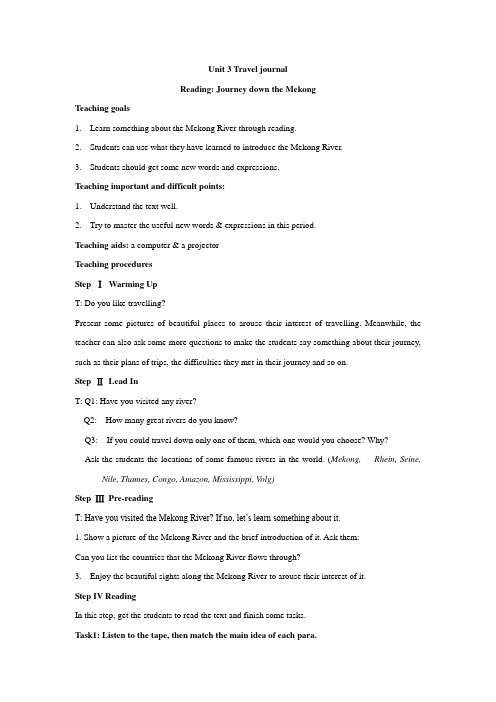
Unit 3 Travel journalReading: Journey down the MekongTeaching goals1.Learn something about the Mekong River through reading.2.Students can use what they have learned to introduce the Mekong River.3.Students should get some new words and expressions.Teaching important and difficult points:1.Understand the text well.2.Try to master the useful new words & expressions in this period.Teaching aids: a computer & a projectorTeaching proceduresStep ⅠWarming UpT: Do you like travelling?Present some pictures of beautiful places to arouse their interest of travelling. Meanwhile, the teacher can also ask some more questions to make the students say something about their journey, such as their plans of trips, the difficulties they met in their journey and so on.Step ⅡLead InT: Q1:Have you visited any river?Q2: How many great rivers do you know?Q3: If you could travel down only one of them, which one would you choose? Why?Ask the students the locations of some famous rivers in the world. (Mekong, Rhein, Seine, Nile, Thames, Congo, Amazon, Mississippi, Volg)Step ⅢPre-readingT: Have you visited the Mekong River? If no, let’s learn something about it.1. Show a picture of the Mekong River and the brief introduction of it. Ask them:Can you list the countries that the Mekong River flows through?3.Enjoy the beautiful sights along the Mekong River to arouse their interest of it.Step IV ReadingIn this step, get the students to read the text and finish some tasks.Task1: Listen to the tape, then match the main idea of each para.Para.1 preparation for their tripPara.2 their dreamPara.3 a stubborn sisterTask2: Read para.1 and para.2 carefully, then answer some questionsQ1. Who are Wang kun and Wang Wei?Q2.What are their dreams?Q3.Who are Dao Wei and Y u Hang?Q4. Is it a difficult journey to cycle along the Mekong? Why?Q5.What can you see when you travel along the Mekong River?Task3: Careful reading for para.3 and find out the information of the Mekong.Task4: Group workWork in groups of 4 and try to be a tour guide and introduce the Mekong.Fill in the blanks•①The Mekong River which is called the Lancang River in China begins in a ______ ona Tibetan mountain and enters the ________________ at last.•②At first the river is small and the water is ______ and _____. Then it begins to move ______. Sometimes it becomes ______, sometimes it becomes a __________.After it leaves China and high altitude, it becomes ____, _____ and _____. As it enters Southeast Asia, its ____ slows.Step V Post-readingTask 1:Make comparisonAn attitude is what a person thinks about something. Make lists of Wang Wei’s and Wang Kun’s similar and different attitudes about the trip.Task 2: DebateWhich character do you like, Wang Kun or Wang wei? Why?Task 3: Understand two mottosKeep everything before a rainy day.未雨绸缪,有备无患。
高一英语Unit 3 Travel Journal---Using language教案
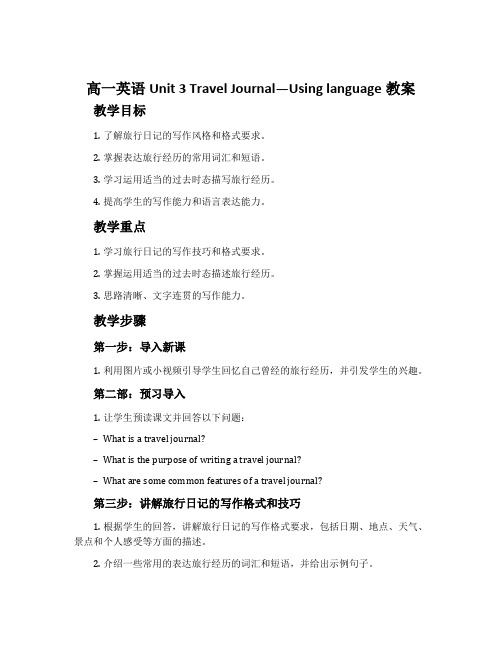
高一英语Unit 3 Travel Journal—Using language教案教学目标1.了解旅行日记的写作风格和格式要求。
2.掌握表达旅行经历的常用词汇和短语。
3.学习运用适当的过去时态描写旅行经历。
4.提高学生的写作能力和语言表达能力。
教学重点1.学习旅行日记的写作技巧和格式要求。
2.掌握运用适当的过去时态描述旅行经历。
3.思路清晰、文字连贯的写作能力。
教学步骤第一步:导入新课1.利用图片或小视频引导学生回忆自己曾经的旅行经历,并引发学生的兴趣。
第二部:预习导入1.让学生预读课文并回答以下问题:–What is a travel journal?–What is the purpose of writing a travel journal?–What are some common features of a travel journal?第三步:讲解旅行日记的写作格式和技巧1.根据学生的回答,讲解旅行日记的写作格式要求,包括日期、地点、天气、景点和个人感受等方面的描述。
2.介绍一些常用的表达旅行经历的词汇和短语,并给出示例句子。
3.引导学生练习如何把旅行经历用适当的过去时态描述出来。
第四步:示范写作和讲解1.展示一个范例旅行日记,并解读其写作技巧和语言表达方式。
2.与学生一起分析范例旅行日记,找出其中的亮点和不足之处。
3.强调写作时需要注意的事项,如遣词造句的准确性、语法和拼写错误的避免等。
第五步:练习和讨论1.让学生以小组为单位,互相检查和修改自己的旅行日记草稿。
2.让学生轮流朗读自己的旅行日记,并让其他同学提出反馈和建议。
3.引导学生讨论旅行日记的特点和价值,以及怎样写出一篇出色的旅行日记。
第六步:作业布置1.让学生完成自己的旅行日记,并收集一些关于旅行的图片或照片,准备下节课展示。
教学反思本节课通过导入新课、预习导入、讲解旅行日记的写作格式和技巧、示范写作和讲解、练习和讨论以及作业布置等步骤,帮助学生了解旅行日记的写作要求和技巧,并提升他们的写作能力和语言表达能力。
人教版高中高一上册英语《Unit 3 Travel journal》教案

人教版高中高一上册英语《Unit 3 Travel journal》教案一、教学目标1.掌握重点词汇和短语,如destination, culture, historical site, local cuisine, traveler, itinerary等。
2.能够正确理解并运用课文中鲜明的主题,并能够通过口语和写作表达自己的观点。
3.了解一些国家的文化和历史,并通过总结旅游经验和意见,最终能够就出游的目的地和旅游方式进行讨论。
二、教学重点1.掌握目的地选择与旅游路线规划的关键词汇和短语。
2.阅读文本的能力,理解并分析其中的观点和主题。
3.掌握旅游相关的口语表达。
三、教学难点1.教授学生如何就目的地和旅游方式进行讨论并提出有建设性的意见。
2.通过英语听力以及其他资源,向学生展示不同国家和地区的文化和历史。
四、教学方法1.通过小组讨论展开学生的自我表达能力。
2.通过与学生互动,引导他们养成批判和理性的思维习惯。
3.联合多种资源,包括音频、视频等手段,让学生更加深入地了解就目的地和旅游方式进行讨论的相关话题。
五、教学过程1. 目的地选择和旅游方式探究让学生组成小组,为一次旅行选择目的地并提出旅游方式的想法。
鼓励学生使用他们在本单元之前所学的词汇表达出自己的意见。
组长可以对学生提出的想法进行总结,并以此贡献组内的思路。
2. 阅读理解学生可以阅读并分享他们的旅游日记。
这个过程中,教师可以向学生介绍一些世界知名旅游景点,例如埃菲尔铁塔和各种宫殿等。
3. 呈现文化和历史老师可以使用音频、视频等资源,从文化和历史的角度向学生展示不同国家和地区的传统和历史文化。
这个过程可以由教师策划,或者是让学生自己从互联网中寻找其他资源。
4. 小组讨论教师或课堂中的学生可以提出一些讨论题目,让学生在小组内进行讨论并总结共识。
例如:•许多人喜欢去旅游目的地,仅仅是为了照相留念。
对于这种做法,你有什么看法?•众所周知,旅行有许多好处。
《Unit 3 Travel journal》教学设计
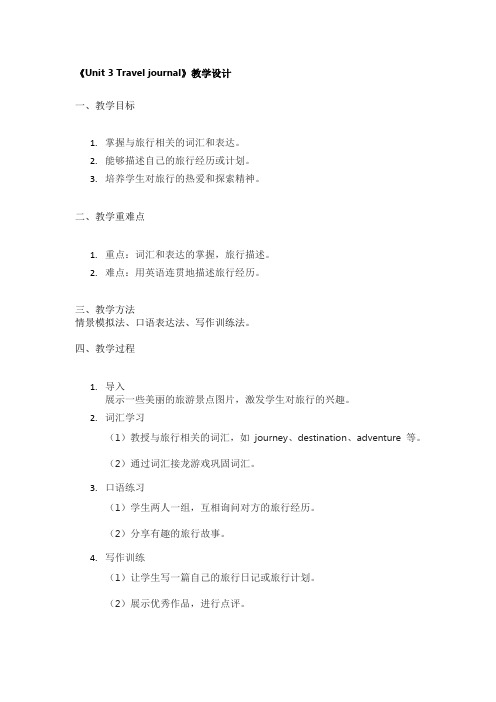
《Unit3Travel journal》教学设计
一、教学目标
1.掌握与旅行相关的词汇和表达。
2.能够描述自己的旅行经历或计划。
3.培养学生对旅行的热爱和探索精神。
二、教学重难点
1.重点:词汇和表达的掌握,旅行描述。
2.难点:用英语连贯地描述旅行经历。
三、教学方法
情景模拟法、口语表达法、写作训练法。
四、教学过程
1.导入
展示一些美丽的旅游景点图片,激发学生对旅行的兴趣。
2.词汇学习
(1)教授与旅行相关的词汇,如journey、destination、adventure等。
(2)通过词汇接龙游戏巩固词汇。
3.口语练习
(1)学生两人一组,互相询问对方的旅行经历。
(2)分享有趣的旅行故事。
4.写作训练
(1)让学生写一篇自己的旅行日记或旅行计划。
(2)展示优秀作品,进行点评。
5.课堂小结
总结旅行相关的词汇和表达,以及如何描述旅行。
6.作业布置
(1)制作一份自己梦想旅行地的海报,用英语介绍。
(2)阅读一篇关于旅行的英语文章。
Unit 3 Travel journal 教案(1)
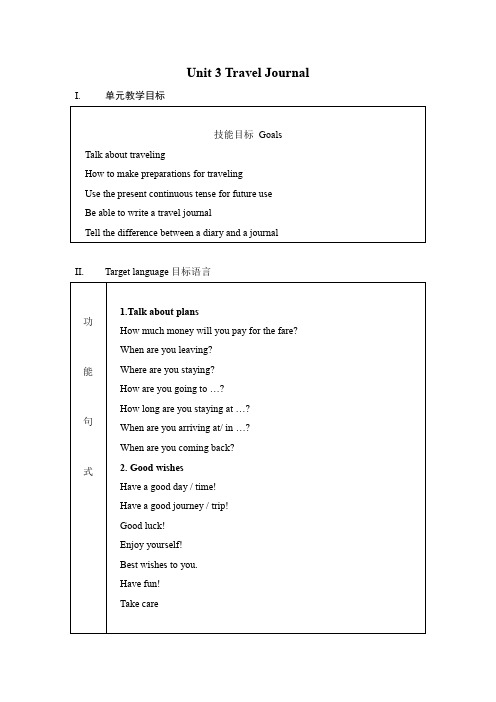
Unit 3 Travel Journal I.单元教学目标II.Target language目标语言Ⅲ教材分析与组合1 教材分析本单元以travel为主题,使学生通过travel了解他们所去国家或地区的风土人情,地理地貌及气候特征。
让学生体会英语作为工具给他们带来的乐趣。
学生可以利用英语扩大自己的视野,获取知识,了解世界。
学生可以通过相互讨论和相互交流以丰富各自的地理知识。
进一步扩大学生的词汇量。
能正确使用现在进行时的形式表达将来的计划和安排。
本单元把Travel Down the Mekong分成六部分,其中三部分作为阅读材料而另三部分作为听力材料。
通过本单元的学习使学生掌握一些重要词汇及词组,并能够写出自己的旅行日志来提高自己的写作水平。
1.1 Warming-up 让学生想象去旅游并选择一个地方为题,讨论所需费用,并决定四种交通方式,使学生了解旅行前的准备及计划。
1.2 Pre-reading 部分的三个问题是通过讨论河流在人民生活中的作用以及看图回答问题,让学生找到湄公河流域的国家,作为阅读的“热身”1.3 Reading 是日志的第一部分,它讲述了王坤和王薇的骑车旅行梦想和计划,描述了他们为这次旅游所做的准备,对旅游路线的选定以及他们通过查阅地图对湄公河情况的了解。
文章用第一人称的方式,通过对王薇做事的方式的介绍,让大家了解了她的性格特点,使人倍感亲切,给人留下深刻的印象。
日志的第二部分放在workbook 中,主要讲述他们在西藏山中度过的一宿,以及旅行中的苦与乐。
1.4 Comprehending第一题是信息题,通过问答使学生进一步理解课文以训练学生获取信息的能力。
第二题是理解题,让学生用自己的话解释课文中的句子。
第三题是推断题,让学生通过主人公的行为来推断他们对旅行的态度。
第四、五题是语言运用题,用以提高学生运用语言的能力。
1.5 Learning about language分两部分,第一部分是旨在通过三个题型的练习使学生掌握目标语言。
《Unit3Traveljournal》教案高中必修1英语
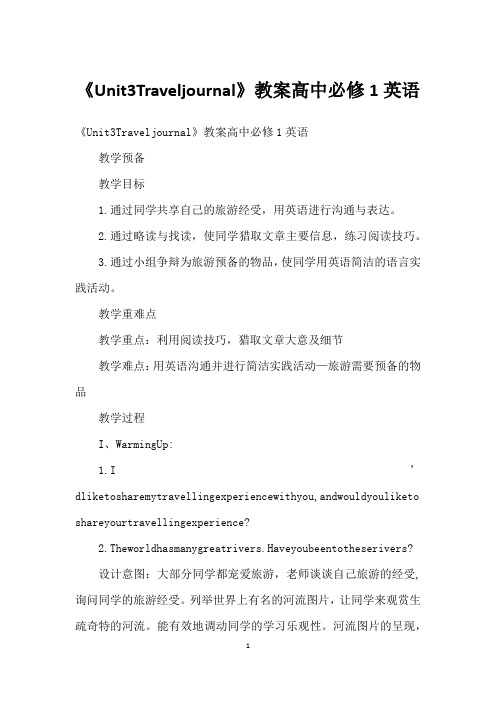
《Unit3Traveljournal》教案高中必修1英语《Unit3Traveljournal》教案高中必修1英语教学预备教学目标1.通过同学共享自己的旅游经受,用英语进行沟通与表达。
2.通过略读与找读,使同学猎取文章主要信息,练习阅读技巧。
3.通过小组争辩为旅游预备的物品,使同学用英语简洁的语言实践活动。
教学重难点教学重点:利用阅读技巧,猎取文章大意及细节教学难点:用英语沟通并进行简洁实践活动—旅游需要预备的物品教学过程I、WarmingUp:1.I’dliketosharemytravellingexperiencewithyou,andwouldyouliketo shareyourtravellingexperience?2.Theworldhasmanygreatrivers.Haveyoubeentotheserivers?设计意图:大部分同学都宠爱旅游,老师谈谈自己旅游的经受,询问同学的旅游经受。
列举世界上有名的河流图片,让同学来观赏生疏奇特的河流。
能有效地调动同学的学习乐观性。
河流图片的呈现,同学猜想河流的名字,唤起同学的学习爱好以及对大自然的宠爱。
II.Pre-readingHaveyoubeentotheMekongRiver?WhatcountriesdoestheMekongRiver flowthrough?设计意图:呈现沿湄公河的地图,引起同学的爱好,让同学观看地图,说出湄公河流经的国家,为随后的阅读做好了内容和词汇上的铺垫。
III.Reading1.SkimmingSkimthepassageandfindthemainideaforeachparagraphPara1:DreamPara2:AstubbornsisterPara3:Preparation设计意图:略读:同学快速扫瞄课文,查找相关信息并搭配段落大意。
点拨阅读技巧:留意每段开头及结尾。
2.Scanning1).ReadPara1andfindthekeywordfortheinformation:WhoandWhatWhereandHowWhyandWhen设计意图:1.查找who,what,where,how,whyandwhen等关键信息,让同学把握这类记叙文的阅读要点。
UnitTraveljourna教案
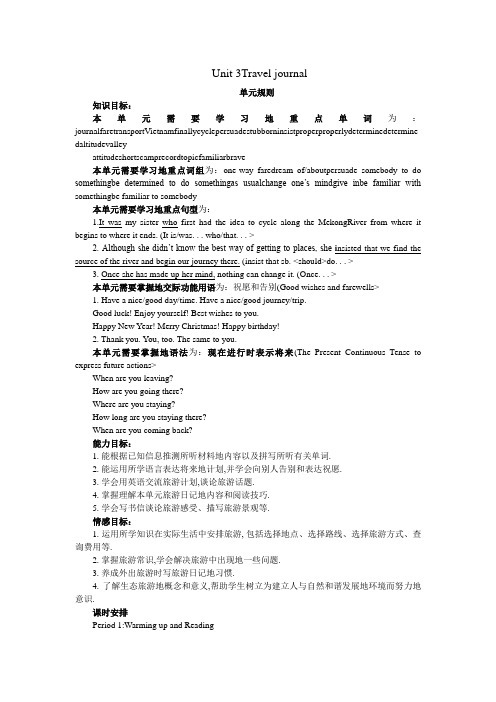
Unit 3Travel journal单元规则知识目标:本单元需要学习地重点单词为:journalfaretransportVietnamfinallycyclepersuadestubborninsistproperproperlydeterminedetermineattitudeshortscamprecordtopicfamiliarbrave本单元需要学习地重点词组为:one-way faredream of/aboutpersuade somebody to do somethingbe determined to do somethingas usualchange one’s mindgive inbe familiar with somethingbe familiar to somebody本单元需要学习地重点句型为:1.It was my sister who first had the idea to cycle along the MekongRiver from where it begins to where it ends. (It is/was. . . who/that. . . >2. Although she didn’t know the best way of getting to places, she i nsisted that we find the source of the river and begin our journey there. (insist that sb. <should>do. . . >3. Once she has made up her mind, nothing can change it. (Once. . . >本单元需要掌握地交际功能用语为:祝愿和告别(Good wishes and farewells>1. Have a nice/good day/time. Have a nice/good journey/trip.Good luck! Enjoy yourself! Best wishes to you.Happy New Year! Merry Christmas! Happy birthday!2. Thank you. You, too. The same to you.本单元需要掌握地语法为:现在进行时表示将来(The Present Continuous Tense to express future actions>When are you leaving?How are you going there?Where are you staying?How long are you staying there?When are you coming back?能力目标:1. 能根据已知信息推测所听材料地内容以及拼写所听有关单词.2. 能运用所学语言表达将来地计划,并学会向别人告别和表达祝愿.3. 学会用英语交流旅游计划,谈论旅游话题.4. 掌握理解本单元旅游日记地内容和阅读技巧.5. 学会写书信谈论旅游感受、描写旅游景观等.情感目标:1. 运用所学知识在实际生活中安排旅游, 包括选择地点、选择路线、选择旅游方式、查询费用等.2. 掌握旅游常识,学会解决旅游中出现地一些问题.3. 养成外出旅游时写旅游日记地习惯.4. 了解生态旅游地概念和意义,帮助学生树立为建立人与自然和谐发展地环境而努力地意识.课时安排Period 1:Warming up and ReadingPeriod 2:Important language pointsPeriod 3:Grammar:The Present Continuous Tense for Future Actions Period 4:ListeningPeriod 5:Extensive ReadingPeriod 6:Speaking and WritingPeriod 7:Revision (Summing up and Learning tip>Period 1Warming up and Reading整体设计 Teaching importants:Get the students to learn different reading skills.Teaching difficulties:Develop the students’ reading ability, especially the ability of understanding implied meanings.Teaching methods:1. Task-based teaching and learning2. Cooperative learning3. DiscussionTeaching aid:The multimedia and other normal teaching tools三维目标Knowledge aims:1. Get the students’ to learn the following useful new words and expressions in thispassage:journalfaretransportVietnamfinallycyclepersuadestubborninsistproperproperlydeterminedegive in2. Get the students to learn about the usage of The Present Continuous Tense to express future actions.Ability aims:Develop the students reading ability and let them learn to use some reading strategies such as skimming, scanning, and so on.Emotional aims:Stimulate the students’ love for nature by getting them to know the greatness of a river.教案过程设计方案<一)→Step 1 Lead -in and Warming up1. Brainstorming some questionsDo you like traveling? Why do you like traveling? Where have you ever been before? How did you get there? If you are given a chance to travel around the world, what kind of transportations will you use and why?Show the chart and ask students to discuss it in of the transportations Means of transportationReasonsby car (in a car>by bikeby plane (by air>by train ( on a train>by bus ( on a bus>by ship (by water or by boat>in a hot balloonby motorbike (on a motorbike>by jeepby truckin a plate2. Following the steps of the Warm up on Page 17.→Step 2 Pre-reading1. Imaging and sharingDo you like traveling along a river? What role does a river play in people’s daily life? That is, how do people who live along a river use it?Suggested answers:People can drink the water in a river.People can wash their clothes in a river.People can swim in summer and skate in winter.People can irrigate their fields.People can use a river to produce electricity.People can travel along a river.. . .2. Talking and sharingAs is known, the world has many great rivers. On the left are names of some great rivers and the right locations where the rivers lie. Please match them.Names of River Locations,SE AsiaAsk the students:If you could travel down only one of them, which one would you choose? Why?3. Listing the countries that the MekongRiver flows through.The students read the map and the third paragraph to list the countries that the MekongRiver flows through.Suggested answer:China, Laos, Thailand, Cambodia, Burma, Vietnam.→Step 4 After-reading→Step 3 While-reading1. SkimmingListen to the tape and match the main idea with each paragraphPara.1 Preparing for their trip.Para.2 Wang Kun and Wang Wei’s dream.Para.3 Wang Wei is stubborn.2. ScanningDiscuss the text in details.1>Wang Kun and _his sister Wang Wei are dreaming about t aking a great bike trip2>They have the idea tocycle alongthe MekongRiver from whereitbeginsto where it ends.3>.What can they see during the journey?It begins in aglacieron a Tibetanmountain4)At last, the river delter entersthe South China Sea.Read the text again, then answer the following questions:1>.What was Wang Kun and Wang Wei’s idea of a good trip?2>. Who planed the trip to the Mekong?3>. Where is the source ofthe MekongRiver and which sea does it enter?4>. What can you see when you travel along the Mekong?5>. Is it a difficult journey along the MekongRiver?Read the text again ,then finish the following form:①The Mekong River which is called the Lancang River in China begins in a ______ on a Tibetan mountain and enters the ________________ at last.②At first the river is small and the water is ______ and cold. Then it begins to move ______. After it leaves China and high altitude, it becomes wide, brown and warm. As it enters Southeast Asia, its pace slows. ③Sometimes it becomes ______, sometimes it becomes a waterfall.Read the text again and fill in the blanksMy name is Wang Wei. My brother Wang Kun and I have _________________ taking a great bike trip. When we _________ from college, we decided to ride bicycles to travel along the MekongRiver. Although I didn’t know the best way of getting to places, I ______ I organize the trip ________. When I knew that the journey would begin at an altitude of more than 5,000 meters, I seemed to be ______ about it.When I was told the air there would be cold and hard to ______, I thought it would be an interesting _________. Once I have _______________, nothing can change it. So Wang Kun had to ______. Because I wouldn’t change my mind, someone says I am a little _________, but I think I am just a person with great determination.What do you think of Wang Wei? What can you learn from her?→Step 4 Homework1. Finish off the workbook exercises.2. Retell the passage in your own words within 200 hundred words.板书设计Unit 3Travel journalPART 1THE DREAM AND THE PLANMatch rhe main dea with the paragraph.Para1: Wang Kun and Wang Wei’sdream.Para2: Wang Wei is stubborn.Para3: Preparing for their trip.Summary:The students can understand the text well, they can find the answers to the questions.To improve their reading ability ,Ishould give them more exercises to practice.Unit 3Travel journalPeriod 2整体设计Teaching important points:1. Enable the students to grasp the usages of such important new words and expressions as persuade, insist, care about, give in, etc.2. Get the students to master the usage of the pattern “It is. . . that/who. . . ”Teaching important points:1. Let the studen ts learn the usage of the word “insist”.2. Enable the students to master the usage of the pattern “It is. . . that/who. . . ” and understand some difficult and long sentences.Teaching methods:1. Discussing, summarizing and practicing2. Cooperative learningTeaching aid:The multimedia and other normal teaching toolsKnowledge aims:1. Get the students to learn and grasp some important new words and expressions:journal fare transport Vietnam finally cycle persuade stubborn insist proper properly determine determined altitude valley attitude change one’s mind care about give in2. Get the students to learn some useful sentence patterns:1>It was my sister who first had the idea to cycle along the MekongRiver from where it begins to where it ends. (It is/was. . . who/that. . . >2>Although she didn’t know the best way of getting to places, she insisted that we find the source of the river and begin our journey there. (insist that sb. <should> do. . . >3>She gave me a determined look—the kind that said she wouldn’t change her mind. (the Attributive Clause>4>Once she has made up her mind, nothing can change it. (Once. . . >Ability aims:1. Enable the students to use some useful words and expressions correctly.2. Enable the students to make sentences after the useful sentence patterns.Emotional aims:1. Stimulate the students’ interest in learning English.2. Develop the students’ spirit of cooperation and teamwork.教案过程设计方案<一)→Step 1 Revision1. Check the homework exercises.2. Ask some students to tell something about Wang Kun and Wang Wei’s bike trip or the MekongRiver.→Step 2 Reading and practice1. Get the students to read the reading passage again to underline all the new words and useful expressions or collocations in the passage.Collocations:dream about, take a great bike trip, graduate from, get the chance to do sth. , cycle along the river, go for long bike rides, mountain bike, persuade sb. to do sth. , grow up, get sb. interested in sth. , the best way of getting to places, the source of the river, care about, give sb.a determined look, change one’s mind, at an altitude of, an interesting experience, make up one’s mind, give in, a large atlas with good maps, keep doing sth. , pass through, be surprised to do sth. , half of, at last, the South China Sea2. Do the exercises in Discovering useful words and expressions on Page 20.→Step 3 CheckingExplain the problems the students meet while checking the answers.→Step 4 Language Points1. one-way fare single-way fare单程票价round-way fare往返/双程票价one-way ticket单程票round-way ticket往返/双程票2. dream about dream of 梦想,梦见<后接名词、代词或动名词)What a small world! I wouldn’t dream about/of meeting you here.世界真小,想不到会在这儿遇见你.The young soldier sometimes dreams about/of his hometown.这名年轻地士兵有时会梦到自己地家乡.3. persuade vt. to cause to do something by reasoning, arguing, begging, etc. 说服;劝服Try to persuade him to let us go with him.尽量说服他让我们和他一起去.Nothing would persuade him.什么也说服不了他.He persuaded her to go to school, even though she did not want to.尽管她不想去上学,他还是说服她去了.1>persuade sb. into/out of sth. /doing sth. to cause sb. (not>to do sth. by arguing or reasoning 说服或劝说某人<不)做某事Wang Kun couldn’t persuade his sister into changing her mind.王昆说服不了他姐姐改变主意.The old man finally persuaded the little boy out of stealing.老人最终说服小男孩不偷东西了.2>persuade sb. +that clause:cause sb. to believe sth. 。
Unit 3《Travel Journal》教案13(人教版必修1)
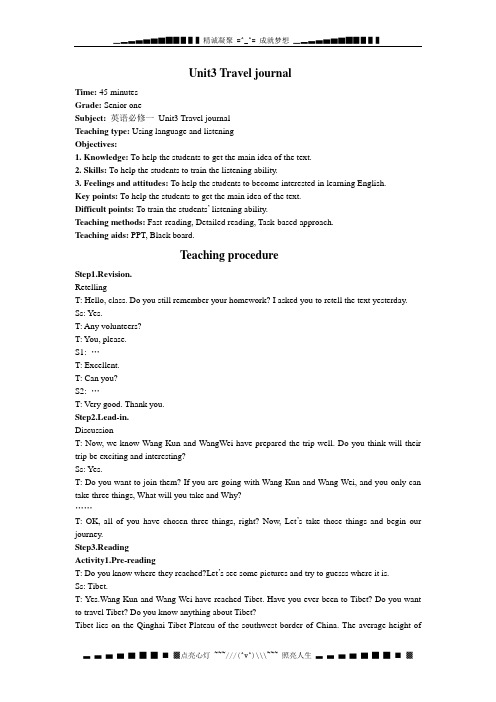
Unit3 Travel journalTime: 45 minutesGrade: Senior oneSubject:英语必修一Unit3 Travel journalTeaching type: Using language and listeningObjectives:1. Knowledge: To help the students to get the main idea of the text.2. Skills: To help the students to train the listening ability.3. Feelings and attitudes: To help the students to become interested in learning English.Key points: To help the students to get the main idea of the text.Difficult points: To train the students’ listening ability.Teaching methods: Fast-reading, Detailed reading, Task-based approach.Teaching aids: PPT, Black board.Teaching procedureStep1.Revision.RetellingT: Hello, class. Do you still remember your homework? I asked you to retell the text yesterday. Ss: Yes.T: Any volunteers?T: You, please.S1: …T: Excellent.T: Can you?S2:…T: Very good. Thank you.Step2.Lead-in.DiscussionT: Now, we know Wang Kun and WangWei have prepared the trip well. Do you think will their trip be exciting and interesting?Ss: Yes.T: Do you want to join them? If you are going with Wang Kun and Wang Wei, and you only can take three things, What will you take and Why?……T: OK, all of you have chosen three things, right? Now, Let’s take those things and begin our journey.Step3.ReadingActivity1.Pre-readingT: Do you know where they reached?Let’s see some pictures and try to guesss where it is.Ss: Tibet.T: Yes.Wang Kun and Wang Wei have reached Tibet. Have you ever been to Tibet? Do you want to travel Tibet? Do you know anything about Tibet?Tibet lies on the Qinghai-Tibet Plateau of the southwest border of China. The average height ofthe whole region is more than 4,000 meters above sea level, for which Tibet is known as “Roof of the World”. It is freezing cold in most time of the year. Most tourists come to visit Tibet only in the warmest seasons, June, July, August and early September.(教师做一下简单的介绍)Activity2. Fast readingT: I will give you two minutes to read the text quickly, and try to do the true or false exercises. 1. They reached Tibet in winter. FThey reached there in auturm, but the snow was already begin2. Wang Wei always rode in front of me. TWang Wei rode in front of me as usual.3. They changed their coats for T-shirt because of the warm weather. T4. They went to sleep early in their tent. FWang Wei went to sleep but Wang Kun stayed awake.5. Their cousins will join them in Dali. TActivity3. Detailed readingfeel lonely? Why?Ss: The beautiful view he saw and that they are going to meet their cousins made him made him feel happy, but not lonely.Activity4.TalkingT: Along this trip, what items are Wang Kun and Wang Wei carrying with them?S1: Water bottles, cap, coat, gloves, trousers and tent.T: What do you think they will have to leave behind in Dali?S2: Cap, coat, gloves and trousers.T: The weather in Tibet is very cold, so we need coat and gloves, but they are going to countries in Southeast Asia, such as Laos, in those countries there is no winter, spring and autumn, only summer. Before the journey, you have chosen three things with you, right? So now what will you give up and what will you take instead?S1:……S2:……Step4.ListeningActivity1. Introducing Laos.T: Now they reached Laos, Let’s learn something about Laos.The People's Democratic Republic of Laos lies on the south of China, east of Myanmar, west of ViệtNam and north of Thailand and Cambodia. It covers a total land area (写黑板,“占地”)of 235,000 square kilometres (an area slightly larger than Great Britain), some 70 per cent of whichis made up of mountain, highland and plateaux.The Mekong River which flows into it has always been at the heart of Lao civilisation and culture.(打在PPT)Activity2. Filling in the blankT: OK, Wang Kun and Wang Wei talked with a Laotian lived beside the Mekong River, Do you want to know what will they talk about? Let’s listen to the mp3, and try to fill in the blank.(放两次然后让学生填,第三次边听边校对答案)T: Now, can you tell me the main idea of the text, please fill in the blank.Wang Kun and Wang Wei me____fishing by the river in Laos, and they talked about____and____. Activity4. QuestionsT: Listen to the mp3 again, try to answer some questions.(After listening to the tape)T: 1. Do people like the change of lifestyle? What about the old man’s attitude?S1: Some people like the change of lifestyle because their life is better. The old man prefer the old way of life.T: 2.Why does the man prefer the old way of life?S2: Because he likes the peaceful life along the river and he doesn’t like the noise of the city.T: Can you think of anything similar in china?Ss:Three Gorges DamT: One million people have been displaced by the dam as of 2006; many are living under poor conditions. Many people have moved to new places where their lifestyle may have changed.Step5. Homework.1.作业本2.课本50页的阅读预习。
高中英语Unit3TraveljournalPeriod1教案新人教版必修
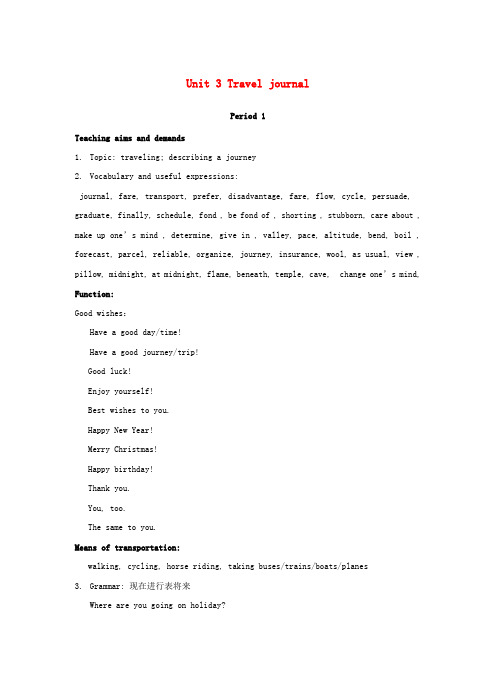
Unit 3 Travel journalPeriod 1Teaching aims and demands1.Topic: traveling; describing a journey2.Vocabulary and useful expressions:journal, fare, transport, prefer, disadvantage, fare, flow, cycle, persuade, graduate, finally, schedule, fond , be fond of , shorting , stubborn, care about , make up one’s mind , determine, give in , valley, pace, altitude, bend, boil , forecast, parcel, reliable, organize, journey, insurance, wool, as usual, view , pillow, midnight, at midnight, flame, beneath, temple, cave, change one’s mind, Function:Good wishes:Have a good day/time!Have a good journey/trip!Good luck!Enjoy yourself!Best wishes to you.Happy New Year!Merry Christmas!Happy birthday!Thank you.You, too.The same to you.Means of transportation:walking, cycling, horse riding, taking buses/trains/boats/planes3.Grammar: 现在进行表将来Where are you going on holiday?I am going to Hawaii on holiday.When are we ing back?Teaching procedure:Step 1.Warming up1.Ask some questions:Do you often travel? Where have you been?2.Following the steps of the warmingup on page 17.Step 2. Prereading1.Show some traveling pictures of the teacher’s.2.Ask Ss : which river is the longest one in the world and which is the largestone; which river is the longest one in China.3.Ask Ss: how people who live along a river use it.Step 3. Whilereading1.Scanning: Ss read quickly and answer:What are they going to do?2.Skimming: Ss read again and finish prehending 1 on page 19.3.Ss read and get the main ideas of each paragraph.4.Ss list the countries that the Mekong River flows through.Step 4. AfterreadingSs in pairs and discuss: Wang Wei’s and Wang Kun’s similar and different attitudes about the trip.Step 5. Assignment1.surf the internet and get more information about the Mekong River.2.retell the passage using your own words.。
高中英语 Unit 3 Travel journal 课文要点教案 新人教版必修1
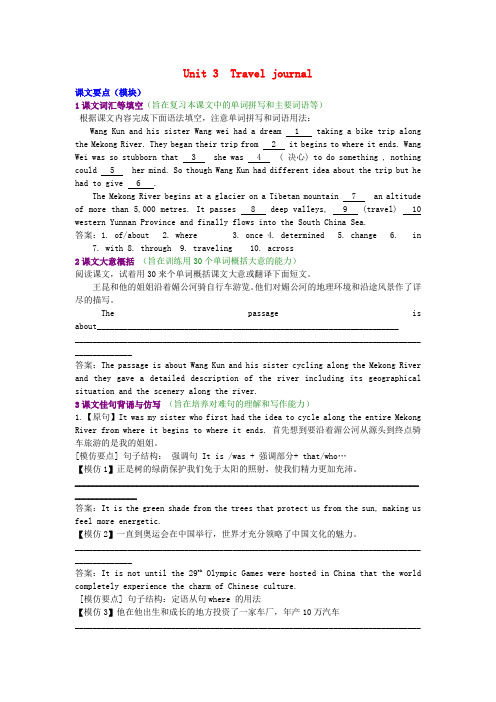
Unit 3 Travel journal课文要点(模块)1课文词汇等填空(旨在复习本课文中的单词拼写和主要词语等)根据课文内容完成下面语法填空,注意单词拼写和词语用法:Wang Kun and his sister Wang wei had a dream 1 taking a bike trip along the Mekong River. They began their trip from 2 it begins to where it ends. Wang Wei was so stubborn that 3 she was 4 ( 决心) to do something , nothing could 5 her mind. So though Wang Kun had different idea about the trip but he had to give 6 .The Mekong River begins at a glacier on a Tibetan mountain 7 an altitude of more than 5,000 metres. It passes 8 deep valleys, 9 (travel) 10 western Yunnan Province and finally flows into the South China Sea.答案:1. of/about 2. where 3. once 4. determined 5. change 6. in7. with 8. through 9. traveling 10. across2课文大意概括(旨在训练用30个单词概括大意的能力)阅读课文,试着用30来个单词概括课文大意或翻译下面短文。
王昆和他的姐姐沿着媚公河骑自行车游览。
他们对媚公河的地理环境和沿途风景作了详尽的描写。
The passage is about_________________________________________________________________________________________________________________________________________________________________答案:The passage is about Wang Kun and his sister cycling along the Mekong River and they gave a detailed description of the river including its geographical situation and the scenery along the river.3课文佳句背诵与仿写(旨在培养对难句的理解和写作能力)1.【原句】It was my sister who first had the idea to cycle along the entire Mekong River from where it begins to where it ends. 首先想到要沿着湄公河从源头到终点骑车旅游的是我的姐姐。
- 1、下载文档前请自行甄别文档内容的完整性,平台不提供额外的编辑、内容补充、找答案等附加服务。
- 2、"仅部分预览"的文档,不可在线预览部分如存在完整性等问题,可反馈申请退款(可完整预览的文档不适用该条件!)。
- 3、如文档侵犯您的权益,请联系客服反馈,我们会尽快为您处理(人工客服工作时间:9:00-18:30)。
Unit 3 Travel JournalLanguage points 教案设计Teaching aims:Knowledge aims:1. Get the students to learn and grasp some important new words and expressions: journal fare transport finally cycle persuade stubborn insist proper properly determine determined altitude valley attitude change one' smind care about give in2. Get the students to learn some useful sentence patterns:1) It was my sister who first had the idea to cycle along the Mekong River from where it begins to where it ends. (It is/was . . . who/that. . .)2) Although she didn kn'owt the best way of getting to places, she insisted that we find the source of the river and begin our journey there. (insist that sb. <should> do. . .)3) Once she has made up her mind, nothing can change it. (Once. . .) Ability aims:1. Enable the students to use some useful words and expressions correctly.2. Enable the students to make sentences after the useful sentence patterns. Emotional aims:1. Stimulate the students ' interest in learning English.2. Develop the students ' spirit of cooperation and teamwork. Teaching important points:1. Enable the students to grasp the usages of such important new words and expressions as persuade, insist, care about, give in, etc.2. Get the students to master the usage of the pteartn “ It is . . . that/who. . . ”Teaching difficult points:1. Let the students learn the usage of the word “ insist ”.2. Enable the students to master the usage of the pattern “ It is . . . that/who. . . understand some difficult and long sentences.Teaching methods:1. Discussing, summarizing and practicing2. Cooperative learningTeaching tools:The multimedia and other normal teaching toolsTeaching procedures:Step 1 Revision1. Check the homework exercises.2. Ask some students to tell somethingabout Wang Kun and Wang Wei ' s bike trip or the Mekong River.Step 2 Reading and practice1. Get the students to read the reading passage again to underline all the new words and useful expressions or collocations in the passage.Collocations: dream about, graduate from, get the chance to do sth. , persuade sb. to do sth. , grow up, get sb. interested in sth. , care about, give sb. a determined look, change one 's mind, make up one ' s mind, give in, keep doing sth. , pass through, be surprised to do sth. , at last2. Do the exercises in Discovering useful words and expressions on Page 20.Step 3 CheckingExplain the problems the students meet while checking the answers.Step 4 Language Points1. dream about dream of 梦想,梦见(后接名词、代词或动名词)The young soldier sometimes dreams about/of his hometown. 这名年轻的士兵有时会梦到自己的家乡。
3. persuade v说服;劝服He persuaded her to go to school, even though she did not want to.尽管她不想去上学,他还是说服她去了。
1)persuade sb. i nto/out of sth. /doi ng sth说服或劝说某人(不)做某事Wang Kun couldn 't persuade his sisntetor ci hanging her mind.王昆说服不了他姐姐改变主意。
The old man finally persuaded the little boy out of stealing.老人最终说服小男孩不偷东西了。
4. insist vi. & vt. 坚持或坚决要求We all insist that we (should)not rest until we finish the work. 我们大家都坚决要求不完工就不休息。
活学现用:He insisted that he _____________ really very tired and that he _____________ tohave a rest.A. was; be allowedB. was; must be allowedC. should be; must be allowedD. should be; be allowed答案:A5. care about忧虑;关心;惦念I don 't much care about going to the party.我不太想去参加晚会。
2) care for sb. 喜欢或爱某人,照顾/照料Who will care for your child if you are out? 如果你外出了,谁来照顾你的孩子?6. determine vt. & vi. 决定;确定Let ' s determine a date for the class meeting. 咱们来定一下开班会的日期吧。
be determined to do sth.He was determined to go to collage.他决心上大学。
7. cha ngeone' s min改变主意Once he has made up his mind, nothing can be done to change his mind. 他一旦下定决心,什么也改变不了他的主意。
Note: cha ngeone' s min和make up one ' s m 中d勺mi nd 是可数名词,意思是想法;主意”,单复数随one'变化。
8. give in v. adv. (to)屈服;投降;让步He would die than give in.他宁死不屈。
give in & give up:give up放弃give up sth. /doi ng sth.放弃某物;停止做某事Don' t give up. You still have cha nces to win in the match.不要放弃,你还有机会赢得这场比赛。
give about散布;传播give away泄露;赠送;放弃give back归还;送回give off发出(气味、光、热、声音等)give out用完;用尽;发出(光、热、气体、声音)活学现用:(1) He did n ' ____________ the en emy even ______________ torture.A. give in; un derB. give in to; belowC. give up; overD. give in to; un der(2) D on ' m en ti on that at the beg inning of the story, or it may _____________ theshock ing ending.A. give awayB. give outC. give upD. give off答案:(1)D (2)AStep 5 Sentence focus1. It was my sister who first had the idea to cycle along the Mekong River from where it beg ins to where it en ds.这是一个复合句,主句“ It was my sister who first had the idea..是强调句型,” 强调的是句子的主语my sister;where it beg ins和where it ends都是宾语从句,分别作介词from和to的宾语。
